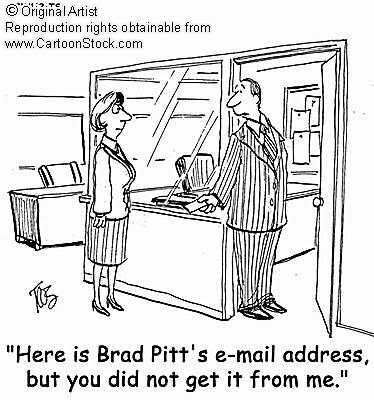Visit SwanktrendzAccording to an article in the UK’s
The Independent there are increasingly more internet
cruisers and users demanding a say in how their personal information is marketed online.
I say, ‘It’s about time!’ Every time I join a website (ie:
Facebook - the user-friendly popular site for exchanging recent photos and communicating news) I cringe at having to give
any (creatively invented or otherwise) personal information. Unfortunately, in order to use these applications, you have to provide
something that they can track, respond or send information to. As soon as I’ve joined an online community, my
Reserved for Websites email account is overflowing with spam urging me to buy online drugs or, better yet, meet Mindy, Cindy, Candy, Dandy or whomever the gal of the moment is.
I get furious with this blatant disregard for subscribers’ online privacy, yet I also realize the internet is the largest unregulated property in the world. No one owns it, no law governs it (although there are attempts.) The internet is a logistical nightmare as it is in a constant state of dynamic change. Even the
US Treasury had to inform the American public of a mishap involving the Treasury’s loss of twenty-five million people’s banking and personal data. And these are the breeches of confidentiality that we
know of.

image from blogs.zdnet.com
The article notes that the US-based internet watchdog community,
MoveOn, is petitioning for removal of
Facebook’s website advertising program
Facebook Beacon which tracks sites where Facebook users browse and spend money. Brilliant marketing idea - saves a lot of survey attempts and/or guessing. However, would you let strangers get into your car and follow you around, keeping notes, while you did your Christmas shopping? (
Hmm, she briefly looked at a lawn mower, model 5340, in Canadian Tire. Send note to Canadian Tire and Honda to spam Christine with lawn mower sales.)
The worst part of this privacy sharing trend is that for every honest retailer who would like your personal information to ensure their shelves are stocked with your favourite items, there are those who simply want your information for criminal use. Identity theft and fraud is up, and the popular target is the aged 14 - 21 demographic. The age where being cautious with one’s personal information is not even considered ‘a threat’.
As we are being pressed to utilize the internet more(from banking to shopping to get more information from the 6:00 news) alarms are being raised about lack of guarantees to users with regard to personal security and confidentiality. If the US government cannot guarantee a citizen’s financial and personal privacy, who can?
Internet users need to monitor their own behaviour, read the small print before clicking the “I Agree” tab that so readily jumps out at you. Perhaps ONLY subscribe to those sites who guarantee and endorse a ‘we don’t share your information’ option.

image from cartoonstock.com
In rebuttal to MoveOn’s claims, Facebook is implying that the company
chooses the businesses with which they are sharing a ‘small selection’ of the consenting Facebook users’ shopping habits and
networks’ of friends information. (This is the part that alarms me.
It is one thing if I mistakenly give out my personal information, but to automatically access and share my friends’ information, simply because they’re stored in my Facebook address book is unacceptable.)
Facebook feels that MoveOn is implying that the Facebook Beacon operates randomly, publicly and with all sites available on the internet. Facebook may indeed be acting honourably but I don’t think the second or third company to buy their list of client information is really going to be that selective about with whom they, in turn, share the information.
I would like to quote
’The Independent’ with this valuable warning:
David Smith, deputy commissioner at the Information Commissioner's Office (ICO) said: "Many young people are posting content online without thinking about the electronic footprint they leave behind. The cost to a person's future can be very high if something undesirable is found by the increasing number of education institutions and employers using the internet as a tool to vet potential students or employees." Lastly, I’d like to remind you, dear reader, that Swanktrendz.com has built into our website
a sign-in feature that does NOT automatically save your email to a database. It is a feature that guarantees no automatic tracking, reader receipt of spam, etc. just because you would like to submit a comment. The editors have to physically read every text content in hopes of retrieving an address Remember to thank site designer, Terry Lowe, for this
deliberate consideration of our readers.
 image from blogs.zdnet.comThe article notes that the US-based internet watchdog community, MoveOn, is petitioning for removal of Facebook’s website advertising program Facebook Beacon which tracks sites where Facebook users browse and spend money. Brilliant marketing idea - saves a lot of survey attempts and/or guessing. However, would you let strangers get into your car and follow you around, keeping notes, while you did your Christmas shopping? (Hmm, she briefly looked at a lawn mower, model 5340, in Canadian Tire. Send note to Canadian Tire and Honda to spam Christine with lawn mower sales.)The worst part of this privacy sharing trend is that for every honest retailer who would like your personal information to ensure their shelves are stocked with your favourite items, there are those who simply want your information for criminal use. Identity theft and fraud is up, and the popular target is the aged 14 - 21 demographic. The age where being cautious with one’s personal information is not even considered ‘a threat’.As we are being pressed to utilize the internet more(from banking to shopping to get more information from the 6:00 news) alarms are being raised about lack of guarantees to users with regard to personal security and confidentiality. If the US government cannot guarantee a citizen’s financial and personal privacy, who can? Internet users need to monitor their own behaviour, read the small print before clicking the “I Agree” tab that so readily jumps out at you. Perhaps ONLY subscribe to those sites who guarantee and endorse a ‘we don’t share your information’ option.
image from blogs.zdnet.comThe article notes that the US-based internet watchdog community, MoveOn, is petitioning for removal of Facebook’s website advertising program Facebook Beacon which tracks sites where Facebook users browse and spend money. Brilliant marketing idea - saves a lot of survey attempts and/or guessing. However, would you let strangers get into your car and follow you around, keeping notes, while you did your Christmas shopping? (Hmm, she briefly looked at a lawn mower, model 5340, in Canadian Tire. Send note to Canadian Tire and Honda to spam Christine with lawn mower sales.)The worst part of this privacy sharing trend is that for every honest retailer who would like your personal information to ensure their shelves are stocked with your favourite items, there are those who simply want your information for criminal use. Identity theft and fraud is up, and the popular target is the aged 14 - 21 demographic. The age where being cautious with one’s personal information is not even considered ‘a threat’.As we are being pressed to utilize the internet more(from banking to shopping to get more information from the 6:00 news) alarms are being raised about lack of guarantees to users with regard to personal security and confidentiality. If the US government cannot guarantee a citizen’s financial and personal privacy, who can? Internet users need to monitor their own behaviour, read the small print before clicking the “I Agree” tab that so readily jumps out at you. Perhaps ONLY subscribe to those sites who guarantee and endorse a ‘we don’t share your information’ option. image from cartoonstock.comIn rebuttal to MoveOn’s claims, Facebook is implying that the company chooses the businesses with which they are sharing a ‘small selection’ of the consenting Facebook users’ shopping habits and networks’ of friends information. (This is the part that alarms me. It is one thing if I mistakenly give out my personal information, but to automatically access and share my friends’ information, simply because they’re stored in my Facebook address book is unacceptable.) Facebook feels that MoveOn is implying that the Facebook Beacon operates randomly, publicly and with all sites available on the internet. Facebook may indeed be acting honourably but I don’t think the second or third company to buy their list of client information is really going to be that selective about with whom they, in turn, share the information.I would like to quote ’The Independent’ with this valuable warning: David Smith, deputy commissioner at the Information Commissioner's Office (ICO) said: "Many young people are posting content online without thinking about the electronic footprint they leave behind. The cost to a person's future can be very high if something undesirable is found by the increasing number of education institutions and employers using the internet as a tool to vet potential students or employees." Lastly, I’d like to remind you, dear reader, that Swanktrendz.com has built into our website a sign-in feature that does NOT automatically save your email to a database. It is a feature that guarantees no automatic tracking, reader receipt of spam, etc. just because you would like to submit a comment. The editors have to physically read every text content in hopes of retrieving an address Remember to thank site designer, Terry Lowe, for this deliberate consideration of our readers.
image from cartoonstock.comIn rebuttal to MoveOn’s claims, Facebook is implying that the company chooses the businesses with which they are sharing a ‘small selection’ of the consenting Facebook users’ shopping habits and networks’ of friends information. (This is the part that alarms me. It is one thing if I mistakenly give out my personal information, but to automatically access and share my friends’ information, simply because they’re stored in my Facebook address book is unacceptable.) Facebook feels that MoveOn is implying that the Facebook Beacon operates randomly, publicly and with all sites available on the internet. Facebook may indeed be acting honourably but I don’t think the second or third company to buy their list of client information is really going to be that selective about with whom they, in turn, share the information.I would like to quote ’The Independent’ with this valuable warning: David Smith, deputy commissioner at the Information Commissioner's Office (ICO) said: "Many young people are posting content online without thinking about the electronic footprint they leave behind. The cost to a person's future can be very high if something undesirable is found by the increasing number of education institutions and employers using the internet as a tool to vet potential students or employees." Lastly, I’d like to remind you, dear reader, that Swanktrendz.com has built into our website a sign-in feature that does NOT automatically save your email to a database. It is a feature that guarantees no automatic tracking, reader receipt of spam, etc. just because you would like to submit a comment. The editors have to physically read every text content in hopes of retrieving an address Remember to thank site designer, Terry Lowe, for this deliberate consideration of our readers.



No comments:
Post a Comment